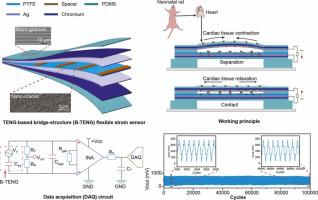Nano Energy ( IF 16.8 ) Pub Date : 2023-01-31 , DOI: 10.1016/j.nanoen.2023.108251 Hao Chen , Anqun Wang , Jun Chen , Weiguang Su , Xingyuan Xu , Jianbo Wang , Xiangdong Li , Meng Meng , Chao Li , Chonghai Xu , Li Wang

|
Triboelectric nanogenerator (TENG) sensors have been widely developed for strain detection in health monitoring. However, current TENG sensors are insufficient to accurately detect the weak strain (< 1%) at the cellular scale (e.g. contraction of cardiomyocytes). Here, we propose a TENG-based strain sensor with a high signal-to-noise ratio (SNR) and stability to quantitatively measure the contractility of cardiomyocytes. 100,000 contact-separation cycles could be stably achieved under the strain of 16.9% (pneumatic pressure = 11 kPa), due to the effective separation of two friction layers between the micro-scale gap (8 µm). 50 µm-thickness friction layer with nano-cracks (average width = 48.1 ± 11.9 nm) lowered the strain detection limit to 0.025% with SNR of 12.1. During 11-day continuous monitoring of cardiomyocytes and drug treatment testings, the device demonstrated high SNR and stability to record the dynamic change caused by contractility of the cardiomyocytes. The flexible strain sensor based on TENG shows the potential of in cardiac pharmacological evaluation strategy.
中文翻译:

基于药物筛选摩擦纳米发电机的心肌细胞收缩力应变传感器
摩擦纳米发电机 (TENG) 传感器已被广泛开发用于健康监测中的应变检测。然而,目前的 TENG 传感器不足以准确检测细胞尺度的弱应变(< 1%)(例如心肌细胞收缩)。在这里,我们提出了一种基于 TENG 的应变传感器,具有高信噪比 (SNR) 和稳定性,可以定量测量心肌细胞的收缩力。由于微尺度间隙 (8 µm) 之间两个摩擦层的有效分离,在 16.9%(气压 = 11 kPa)的应变下可以稳定地实现 100,000 次接触-分离循环。具有纳米裂纹的 50 µm 厚度摩擦层(平均宽度 = 48.1 ± 11.9 nm)将应变检测限降低至 0.025%,SNR 为 12.1。在连续11天的心肌细胞监测和药物治疗试验中,该装置表现出高信噪比和稳定性,能够记录心肌细胞收缩引起的动态变化。











































 京公网安备 11010802027423号
京公网安备 11010802027423号